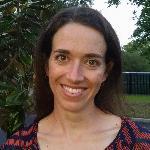
Crowdscoring Place: Engaging Crowds to Assess Local Risk & Readiness by ClimatePlaceProject
 Elizabeth Dowey May 18, 2015 09:52 | Proposal contributor
Nice edit! Did not read it all but got a good sense of it by scanning it.
I was thinking when I finish my next big edit I will change the name and add Version 2.0 to the title (If it fits) to let others know the change.
-Elizabeth Dowey
|
 Steve Thompson May 18, 2015 10:07 | Proposal contributor
Thanks for your helpful comments on the Crowdscoring Place proposal, Elizabeth. Others also provided great suggestions, which I've tried to incorporate into the revision. I didn't add Version 2.0 to my title due to character constraints, but I did modify the title.
|
 Hannah Torres Jun 8, 2015 10:05 |
I'm very curious to see how you will propose to measure each of the risk and readiness factors, especially 'community preparedness and adaptive capacity.' There are so many assessments and indices that try to capture this factor alone, since this can be defined and measured in so many different ways. Very interesting idea, and I love the local focus. The idea reminds me somewhat of the Ocean Health Index, but with a unique crowdsourcing and solutions-oriented component.
|
 Steve Thompson Jun 9, 2015 11:33 | Proposal contributor
Hi Hannah, thanks for reviewing our proposal. And thanks for the great questions. I'll respond to both of your curiosities.
1) How do we propose to measure each of the RnR factors? The crowdscoring component is central to measurement for two reasons. A) There are sufficient data data gaps for many of the indicators that it would stretch credibility to attempt to assign a quantitative, objective score for each indicator. Individuals and experts could legitimately consider the available information and develop a well-informed opinion, but even expert opinions may yield different scores. This is partly a weighting question - what factors and sub-factors are more important than others? But it also reflects the fact that people have different risk tolerance and the hard impacts of climate change will affect people differently. For example, my brother is much more tolerant of hot, humid weather than I am, and he isn't terribly bothered by the fact that the number of extremely hot, humid days are expected to quadruple in his Midwestern town by 2050. But the thought of 2-3 months average of thick, acrid wildfire smoke in my Intermountain West community makes him cringe. But just like the average public and critic scores on Flixter evens out the subjectivity to provide a reasonable measure of a film, a transparent crowdscoring process for climate risk and readiness, informed by available data and expert analysis, will begin to boil down complex dimensions of the picture into a credible number that people can quickly grasp.
2) How do we propose to measure community preparedness and adaptive capacity? This presents a particularly glaring gap in geospatial data for the U.S. Robust measurements can be provided through extensive and expensive ratings systems, such as the STAR Communities Framework, which is excellent. But this is a self selected group and so far covers less than 1% of the 40,000 local government units (municipalities, counties, townships) in the United States. So our challenge is to develop a measurement tool that can be broadly applied to any community that also serves to empower citizens, motivate community action, and shifts beliefs and attitudes. The answer to that challenge, we believe, lies in crowdsourcing data collection through participatory research at the community level using the "urban preparedness score" methodology developed by Oliver Heidrich and his team at Newcastle University in UK. Dr. Heidrich has graciously agreed to join our project team to adapt the UK methodology to North America. To gather this data using traditional academic researchers would probably require more graduate students than exist in all U.S. college sociology and urban planning departments. Heidrich's methodology is accessible to reasonably well-trained high school or community college classes, local citizen groups, and individuals. You can read a summary of their research here: http://www.ncl.ac.uk/press.office/press.release/item/planning-by-postcode1. Send me a private message with an email address, and I'll send you the 2013 article published in the journal Climatic Change along with the separate methodology paper. Or you can contact Dr. Heidrich directly through the Co-Lab. His username is oliverheidrich.
Crowdsourcing this data across the U.S. would be a highly ambitious undertaking. But when you consider the magnitude of the climate challenge and the vast amount of volunteer time already dedicated to social knowledge generation through Wikipedia, Yelp, Flixter, etc., then perhaps it's possible. If society has any chance of reigning in runaway climate change, then this quantum leap is the kind of social engagement and transformation that will be required.
|
 Stevie Harison Jun 12, 2015 04:12 |
Hello from Indonesia,
Good luck for your project proposal.
Just review and make it completed before meet deadline tomorrow.
Thank you,
|
 Steve Thompson Jun 13, 2015 05:31 | Proposal contributor
A big shout out to ESRI and project manager Cody Benkelman, who has joined out Co-Lab Team! Our partners at ESRI have offered to provide an ArcGIS Online subscription account and build a prototype of a modern mapping site if this proposal moves forward to implementation. The mapping site would include access to a variety of existing data layers, including public data available through NOAA's National Climatic Data Center, and the ability to share interactive maps with users on desktop, web, and mobile devices. The platform would allow users to input crowdsourced data developed under Action 2.
|
 Vishal Bhavsar Jun 13, 2015 11:39 |
Amazing concept. Just one suggestion the scoring should be used to engage with local government agencies for them to deploy resources as per the score of climate readiness. This will ensure results beyond awareness and also encourage citizens to participate.
One more suggestion is for local or national elections if the candidate are made to debate on the score of region and be asked to table action plan. This should go a long way.
All the best!
Regards,
Vishal
|
 Elizabeth Dowey Jul 2, 2015 11:33 | Proposal contributor
Congratulations moving to the next phase!
Elizabeth
|
 Steve Thompson Jul 10, 2015 11:52 | Proposal contributor
The Climate Place Project is delighted to advance to the semi-final round. We greatly appreciate the feedback from the judges, who say our proposal is "terrific," but encourages us to be more ambitious. Toward that end, we're expanding our team of contributors and making revisions that will appear by the July 14 deadline. We welcome all feedback and suggestions through this comment forum. We also are willing to add more partners who have something to contribute to this project. Just let me know if you're interested!
|
 Steve Thompson Jul 14, 2015 10:32 | Proposal contributor
The Climate Place Project has revised our "Crowdscoring Place" proposal in response to comments from the judges. Here is a summary of our response:
The Climate Place Project Team appreciates the thoughtful feedback provided by the judges and their investment of time reviewing all the projects.
We have revised our proposal in response to the judges’ comments. They wrote, “While your timeline looks realistic, the judges encourage you to be a bit more ambitious given the potential importance of your terrific project.”
In response to these comments, we have added four new contributors to our diverse team since July 1, enabling us to accelerate implementation of the plan. Under this revision, we propose to initiate all six action items by September 2016, and we have condensed the timeline for full rollout into a four-year window.
The most ambitious component of our plan is to mobilize a small army of citizen researchers to assess and score community adaptive capacity, utilizing and revising as necessary a community preparedness scoring methodology developed by two of our European team members and their colleagues. We have expanded the project team to enable us to hit the ground running on this part of the project. One of our new contributors, Diana Reckien from University of Twente and Columbia University, led a team that has assessed community adaptive capacity in 200 European cities. She and UK community preparedness researcher Oliver Heidrich have offered to help develop an assessment instrument that can be applied by citizen researchers in the U.S. Two other new contributors, Eric Sawtelle in Montana and Elizabeth Dowey in Massachusetts, are secondary and post-secondary science and math instructors who will review the survey instrument from the perspective of student groups or classes that may apply it on the ground utilizing GIS mapping technologies provided by our partners at ESRI. They also will beta test the instrument through real-world application in their communities.
Our academic research partners are interested in evaluating the effectiveness of a crowdsourcing strategy to measure community preparedness. For a subset of communities evaluated by citizen researchers, they also propose to conduct parallel research and cross-analysis by academic researchers for the purposes of quality control and refinement of the citizen research methods. Conversely, our European partners would like to test our crowdsourcing methodology in EU nations.
We’ve further revised the proposal to respond to some readers’ confusion about our use of terminology. We have more clearly summarized the answer to the key questions of who, what, where, when, why and how.
I’d like to add an aside for consideration and feedback from MIT’s Center for Collective Intelligence and its partners. In the process of building our team and revising our proposal, we’ve reflected on the MIT Climate Co-Lab’s operating theory that modest financial awards can serve as inducements for citizens to participate in a crowdsourcing platform. We suspect that this might also be true for the crowdscoring platform we envision. In particular, we would be interested in raising a fund that would offer a modest contribution of $250-500 to teacher activity accounts for classes or school clubs that participate in Action 2. This would offset transportation or other costs that may be incurred during the project and directly address one of the persistent obstacles that often preclude schools from participating in extra-curricular activities.
|
 Steve Thompson Jul 29, 2015 08:19 | Proposal contributor
In both the content of our proposal and through the process of developing our concept, the Climate Place Project has fully embraced the Climate Co-Lab spirit of crowdsourcing climate solutions. Our proposal has evolved through the collaborative involvement of team members, which has grown to 13 people from across the U.S. and Europe. Team members participate from Montana, California, Massachusetts, Arizona, Washington State, Great Britain, and the Netherlands.
The impressive professional biographies and breadth of experience of this team is not fully captured in the contributor profiles posted by these 13 contributors. So in one place, here is a brief biographical sketch of the Climate Place Project Team, ordered alphabetically.
Cody Benkelman is Product Manager for Mapping and Charting Solutions at ESRI. ESRI has offered to build a prototype of a modern mapping site if this proposal moves forward to implementation. The mapping site would include access to a variety of existing data layers, including public data available through NOAA's National Climatic Data Center, and the ability to share interactive maps with users on desktop, web, and mobile devices. The platform would allow users to input crowdsourced data developed under Action 2.
Mikhail Chester is Assistant Professor of Civil, Environmental, and Sustainability Engineering at Arizona State University. He runs a research lab focused on infrastructure design and climate vulnerability. His group largely focuses on questions of heat vulnerability and how the design of infrastructure can contribute to social vulnerability.
Elizabeth Dowey is a math instructor for Northeastern University Foundation Year in Massachusetts. She is the mother of two boys. She’s interested in how we get the media to integrate talk of climate change as deeply as they integrate talk of the economy. She also has submitted a separate proposal to the Climate Co-Lab: Break climate conversation out of its shell! Elizabeth will work with colleagues to develop and beta test a community preparedness scoring methodology that can be applied by high school and post-secondary students in the United States.
Oliver Heidrich is a Senior Researcher in Urban Resource Modelling at Newcastle University in the UK. He has been a practicing civil engineer for more than 20 years. He has developed new approaches in modelling life cycle assessments in urban environments, especially in relation to climate impacts, transport and the built environment. He was the lead author of an article in Climatic Change journal about development and implementation of methods to assess community preparedness for climate change. Together with Diana Reckien, he will help the Climate Place Project adapt the Europe-focused methodology for crowdsourcing community assessments in the U.S.
Steve Loken is the founder and owner of Loken Builders, a green building and development company in Missoula, Montana. He is a member of the Climate Realty team where he is helping produce risk and readiness assessments and serves as an instructor for a continuing education course for real estate professionals.
Diana Reckien is an Assistant Professor for Climate Change at the University of Twente in the Netherlands in the Department of Urban and Regional Planning and Geo-Information Management. Her work there focuses on social issues related to climate change, including the impact on cities. She is an affiliated researcher at the Earth Institute, Columbia University. She is the lead author of a paper in Climatic Change that analyzed climate adaptation and mitigation plans from 200 urban areas in 11 countries. Together with Heidrich, she will help the Climate Place Project adapt the European methodology for crowdsourcing community preparedness assessments in the U.S.
Nikki Reed teaches high school in Whitefish, Montana. She and her colleague, Eric Sawtelle, are leading a community effort to develop a greenhouse and renewable energy systems at a new high school. They provide faculty leadership for the school’s Environmental Club, Project Freeflow and GIS activities. They will work with the team to develop and beta test a community preparedness scoring methodology that can be applied by high school students in the United States.
Brett Rosenberg, currently a sustainability consultant in Missoula, MT, is a former sustainability director for the American Institute of Architects. Brett has also worked with many dozens of mayors and cities across the US in committing to and undertaking local actions that reduce the causes and impacts of global climate change. He is a member of the Climate Realty team where he is helping produce risk and readiness assessments and serves as an instructor for a continuing education course for real estate professionals.
Steven Running is a Regents Professor of Ecology at the University of Montana and a member of the International Panel on Climate Change. He directs the Numerical Terradynamic Simulation Group (NTSG), a research laboratory pioneering new approaches for ecological and hydrological analyses. Using computational process modeling, satellite remote sensing and GIS, NTSG applies ecological theory and environmental analysis to understand how terrestrial vegetation responds to climate variability. He is a member of the Climate Realty team where he is helping produce risk and readiness assessments and serves as an instructor for a continuing education course for real estate professionals.
Eric Salathé is an Associate Professor of Climate Science and an Adjunct Associate Professor of Atmospheric Sciences at the University of Washington. He is the UW Director of the Northwest Climate Science Center and a principal of UW's Climate Impacts Group. The primary focus of his research work is to transform global climate change simulations into information suitable for studying regional impacts of climate change. He is a member of the Climate Realty team where he is helping produce risk and readiness assessments.
Eric Sawtelle teaches high school in Whitefish, Montana. He and his colleague, Nikki Reed, are leading a community effort to develop a greenhouse and renewable energy systems at a new high school. They provide faculty leadership for the school’s Environmental Club, Project Freeflow and GIS activities. They will work with the team to develop and beta test a community preparedness scoring methodology that can be applied by high school students in the United States.
Steve Thompson founded Climate Realty LLC in August 2014 and the Climate Place Project in April 2015. A former journalist, he has held leadership positions in Montana's non-profit conservation community for 24 years. He has been a journalist, philanthropic advisor and writer/editor for National Geographic Maps. He has a sociology degree from Cornell University. He leads the Climate Realty team producing risk and readiness assessments and serves as an instructor for a continuing education course for real estate professionals.
Laurie Yung is an Associate Professor of Natural Resource Social Science in the Department of Society and Conservation at the University of Montana College of Forestry and Conservation. She directs the College's Resource Conservation Program. Among her research priorities is a project to assess community and social vulnerability and adaptive capacity in the context of climate change. She co-directs the Community Vulnerability Working Group, a collaboration with the US Forest Service Rocky Mountain Research Station to build knowledge of social vulnerability and better integrate that knowledge into decision-making, especially in a rural context. She is a member of the Climate Realty team where she is helping produce risk and readiness assessments.
|